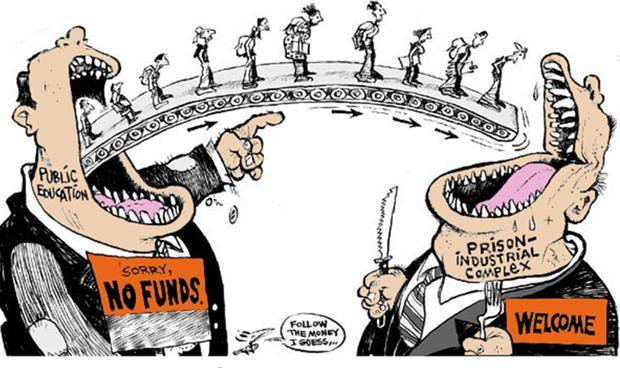Education Expands to Include Incarceration
Posted on 06/19/2015 @ 07:45 PM

Photo Credit: Youth Justice Coalition
By: Michael Hidalgo, LULAC National Programs Intern
We live in a country where we like to think that with the right amount of hard work, anyone can get ahead. Unfortunately, just as policies enacted before the rulings of Brown v. Board of Education
and Mendez v. Westminster prevented minorities from acquiring a fair and quality education, policies in today’s schools continue to push minority students out of schools and directly into prisons.
The lack of funding in today’s school systems has forced our educators to revert to the ineffective discipline policies that were deemed harmful to our youth in the 1990s, one of these being zero-tolerance policies. While these policies were effective at reducing drug use and school violence rates, they were later eliminated as more modern discipline reform policies focused educators on rehabilitative approaches, intending to give at-risk students the resources they lacked and the opportunities they needed to succeed.
Unfortunately, the school administrators and educators of today have reverted to these aggressive discipline policies in the name of school safety. These policies often go as far as replacing hall monitors with police officers who monitor students like prison guards, fencing in school property, installing metal detectors, and reinstating zero-tolerance policies. Schools have zero-tolerance policies against violence, smoking, classroom disruption, public display of affection, and disrespecting security guards. In many instances, these policies provide little to no opportunity for school administrators to use their own judgment when evaluating and addressing student discipline infractions. Under zero-tolerance policies, the charge for carrying cough syrup could face the same consequences as carrying cocaine.
Today, those students most in need of assistance and attention are often the ones experiencing the damaging effects of zero-tolerance policies. Minorities in particular are being deprived of fair discipline methods in schools across the country. Black students are suspended four times more than whites, but worse than the rate of racially biased suspensions,only 5% of all school suspensions were for serious offences in 2012. Countless students are losing valuable education time by being disciplined for minor offences.
Effective discipline methods must encourage personal growth and promote graduation. Racial discrepancies in enforcement have resulted in Black and Latino students being twice as likely not to graduate and much more likely to fill future jail cells.
Education needs to be equipped to handle distressed and disadvantaged youth and attack the reasons they act out. In my personal experience, I have volunteered with many students who have major family issues whose school behavior had put them in the criminal justice system. Instead of defaulting to the justice system, we should be looking into more creative, community-based solutions to rehabilitate our youth, not locking them away and throwing away the key.
As a Criminology, Law, and Society student, I recognize that the justice system is not always the best system for handling distress. Unfortunately, it is not designed to deal with the underlying causes of crime, but only able to dole out punishment. Studying the justice system is often discouraging as you learn that poor investment in our youth results in equally poor opportunities for their future. My experience with troubled youth has taught me that investing in our youth, and providing them with support from an early age translates into increased opportunities and fewer discipline problems in the future.
Latino youth are resilient, and LULAC is dedicated to ensuring our youth do not fall victim to the school to prison pipeline. Our programs across the country are dedicated to encouraging at-risk youth to take initiative and become engaged with their schools and communities. Programs like our Ford Driving Dreams Through Education Program bring mentors, tutoring, and other services to our youth to ensure success in school. Another program, Adelante America, brings leadership opportunities to at-risk youth, motivating and encouraging them to be positive advocates of the community.
Empowering youth with the tools to overcome personal obstacles in a healthy way provides them with a means to take ownership of their life and their choices, reducing the likelihood of discipline problems in school. By combining early intervention and more rehabilitative discipline methods, we can put our youth on the path to success, and permanently disrupt the school to prison pipeline.
Michael Hidalgo is a National Programs Intern at LULAC National. He studies Criminology, Law, and Society at University of California Irvine and graduates in June 2015.

Comments
Leave a Comment
You must be logged in to leave a comment.